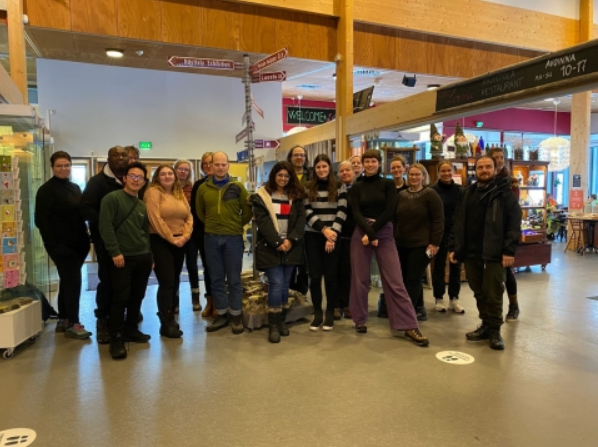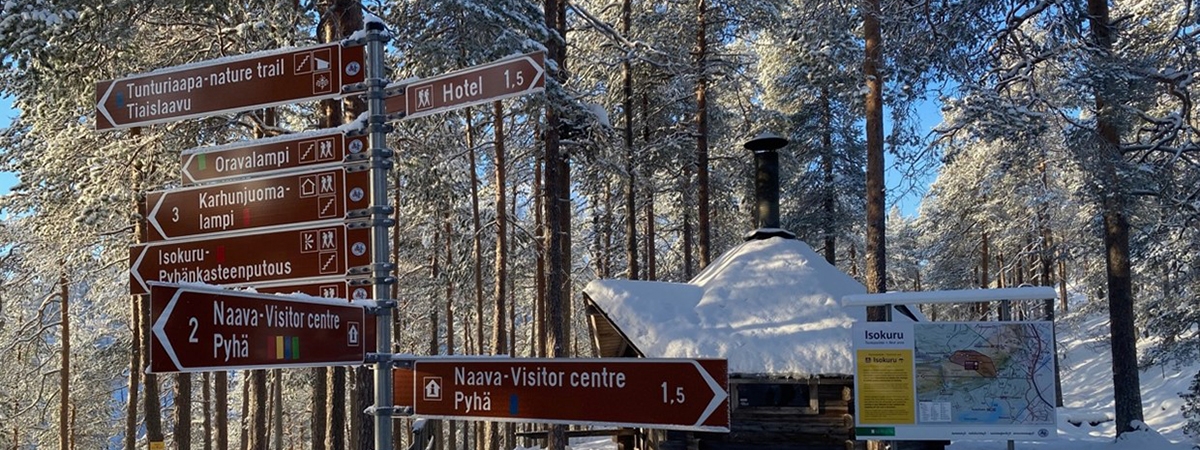Sustainability in Artic Tourism

Nipissing University student returns from Finland with new understanding in sustainability in Artic tourism
Jason Maitland’s interest in sustainability has grown throughout the years and the COVID-19 pandemic as well as the climate emergency have brought the impact of human actions into sharp focus. Currently pursuing a Master of Environmental Studies at Nipissing University, Jason recently travelled to Lapland, Finland, as part of a field course where he spent a week in Pyhä-Luosto National Park with other graduate students exploring the potential need to rethink how we communicate tourism in the era of climate emergency and in the aftermath of the COVID19 pandemic, specifically when it comes to engaging with northern, nature-based tourism destinations.

Jason spent this field course meeting with and listening to various stakeholders in Lapland including those involved in arctic tourism.
He first met with Anu Summanen from Visit Pyhä-Luosto at Lapland Hotels who identified various tourist places of interest, the current bed capacity in the region, as well as plans for future expansions. There, Jason learned that post-COVID-19 overnight stays in the region have surpassed pre-COVID figures.
He later visited the Naava Visitor Centre where he learned more about Pyhä-Luosto National Park and the activities and services offered. During his visit, he built an understanding that the main tasks in managing the Park are to protect special habitats and species, scenic values, and cultural history, however, there are obvious challenges to achieving these conservation efforts due to the renewed focus on economic growth of the tourism industry.
Jason also had the opportunity to hear from a local entrepreneur at Bliss Adventures, who welcomes the prospect of increased tourism in the region and who believes that such an increase should not negatively impact the resources.
“There were many aspects of this trip that were interesting and impactful,” shared Jason. “It was great for students from different programs to come together and in a very short space of time to be able to understand the many challenges facing artic tourism and propose potential solutions.”
He shared that as a native of the Caribbean, this was his first exposure to arctic tourism.
“Clearly there are some significant differences between Arctic tourism and tourism in the Caribbean, but there are also a number of similarities,” he said. “Nonetheless, a key component to success is bringing together all stakeholders in tourism. Listening to the three perspectives presented to us in Lapland brought into sharp focus the need for all stakeholders to have dialogue and create alignment to a shared vision.”
Jason’s current research thesis focuses on Energy Transition and he was pleased to see this incorporated into Finland’s objectives.
“The strides being made in the transport industry is refreshing,” shared Jason. “The vast quantities of electric taxis in Lapland were equally inspiring as well as the focus on everyone’s rights, mental health and other key aspects of the United Nations Sustainable Development Goals.”
Using storytelling throughout this course allowed Jason to bring together several of his passions and allowed him to incorporate photography, videography, and travel with his education.
“Storytelling in all forms continues to be an effective mechanism for the transference of knowledge and has a growing role in sustainability,” he said. “This experience has caused me to rethink methods I currently use in education and has created a desire for me to explore more in the arena of educational sustainability.”
This field course was co-taught by a consortium of instructors in the UArctic Thematic Network on Northern Tourism.
